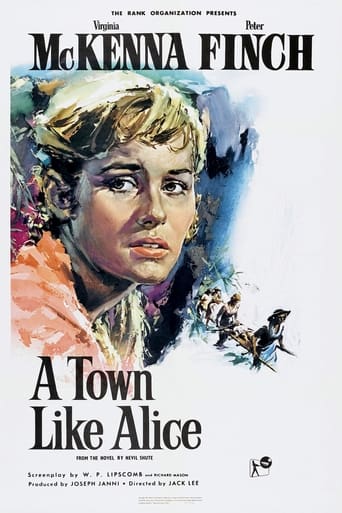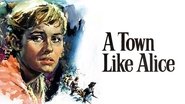Owlets
I cannot add anything more to the excellent review already contributed (thanks, Roger) but I would like to add a few comments. I first watched this film one wet Saturday afternoon on TV with my Dad. It gave me a real insight into the plight of women prisoners of the Japanese during WW2 which was unusual for that period (the early 1960's) as war movies seemed to focus more on Europe. We were studying Australia in Geography at school. Combined with the adventures of 'Skippy the bush kangaroo' this was a heady, exotic mix and oh, how I wanted to be a '£10 Pom' and head off to Oz when I was old enough - and become a flying doctor, of course! Well, I never became a doctor and didn't go to Australia yet I have continued to be fascinated by the outback and the pioneering spirit of Australians and both the book and this film have played their part in this. The story line - mixing flashbacks to the war and the romance between the two key characters never fails to entertain. If ever there was a film ready for a re-make, this is it. The book contains more and could be used in such a re-make but please, pleases, PLEASE let it not be a 'Hollywood make over'! It needs a scriptwriter who can stick to the book and not re-write the ending, a director who understands Australia, an historian to ensure accuracy and a casting director who has read the book and doesn't cast on looks alone. A bit of a challenge, but not impossible.
Paularoc
I discovered Nevil Shute's novels In the 1960s and read them all even though I generally read only mysteries. I have recently drastically cut down on the number of books I own – but have kept the Shute books. He is such a masterful storyteller. In the early 1980s I saw the television version of A Town Like Alice with Helen Morse and Bryan Brown and liked it very much so when I saw the 1956 movie version listed on Netflix, I quickly watched it. The movie is as I remember the first part of the book – a story about British women and children shuffled from one location to another in Malaysia by the occupying Japanese until Malaysian villagers agree to let them stay and work in their village. Jean Paget (Virginia McKenna), a natural leader, meets happy go lucky and brave Australian prisoner of war (Peter Finch). He steals food for the women and is caught. The viciousness with which the Japanese treated prisoners of war and the people of the occupied countries is a well-documented truth. This is a grim tale but it is also a tale where hope still exists and the movie ends on the high note of hope. The flaw with the movie – if it is that – is that it covers about half of the Shute novel; Jean's relocation to Australia (other than the scene in the airport) is not covered at all. Because of that the title of the movie makes no sense. That said, it is still an excellent movie and accurately reflects Shute's novel as far as it went. McKenna and Finch, as to be expected, were excellent. This is one of the more interesting World War II movies.
bkoganbing
The Rank Organisation went whole hog in producing A Town Like Alice with location shooting in Malaya, Australia, and the United Kingdom. The results were well worth the effort and the film was a big boost to the careers of Peter Finch and Virginia McKenna. In fact as Finch was becoming more and more an international star he would get fewer roles like this one, playing a native Australian.I was expecting when deciding to view this film that it would be similar in nature to the American film Three Came Home that starred Claudette Colbert as a woman prisoner of the Japanese in World War II. The woman prisoners were segregated, but quickly housed and fended for themselves as best they could, but in a static setting.When the male prisoners are separated from the females after the fall of Malaya, these woman are put under guard and just sent around like vagabonds with their children if they had them. Why they were selected for this rather special brand of torture we can speculate on end, but whatever the Japanese idea of chivalry was to the women, they couldn't just outright kill them. In fact none are during this film.The film is seen through McKenna's eyes, she's working as a secretary in Kuala Lampur when the Japanese takeover. She takes over too as guardian of her boss's kids after their mother dies early on in the strange odyssey. Peter Finch plays an Australian soldier who with his mates they constantly run into and who offers them help when he can sneak food and medicine from the Japanese. He pays a heavy price for doing this when he's caught.When he was killed by Irish Terrorists in 1979, it was learned that Lord Mountbatten had specifically requested that at his funeral no representation from the Japanese was to be permitted. As Supreme Commander of that theater Mountbatten remembered all the horror stories he heard from people survived Japanese internment, even the strange internment where apparently the whole country was their jail.How McKenna and those that remained survived is quite a story, let's say it involved breaking a lot of cultural barriers to do it. One of the women who did it her own way was Maureen Swanson who after McKenna refuses his proposition, she takes up with a Japanese captain. Swanson is another you'll remember from A Town Like Alice.Alice refers to Alice Springs in Northern Territory where Finch reminisces he'd like to return. It sounds like heaven, looks pretty good too after the years in Malaya. The film is a really good war film from the not often heard from point of view of woman prisoners.
filmsfan38
I have the video of this movie which I got a few years back. I wish they would bring this movie out on DVD. Its wonderfully acted. Hard to believe this was based on a true story. I can't believe these women marched hundreds of miles, having nothing to eat much of the time and some of their companions dying along the way. They must have been a hardy bunch. Its too bad more people couldn't see this movie. Virginia McKenna and Peter Finch were excellent as the main characters and the rest of the supporting cast were very good too. I'm glad to have the video, but would very much like to see a DVD come out on it. The movie is in black and white but this in no way detracts from the story or the acting.


